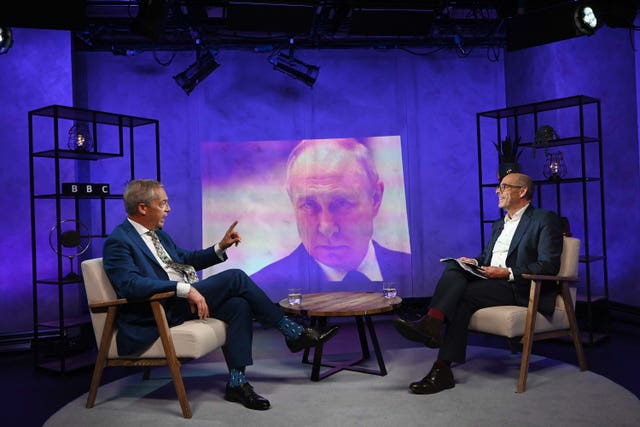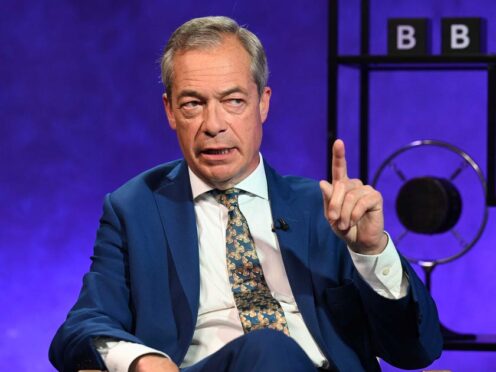Nigel Farage has said he “admired” Vladmir Putin “as a political operator because he’s managed to take control of running Russia”.
Speaking on a BBC Panorama special programme, which airs on BBC One at 7pm, the Reform UK leader also said the country spent “too much time hyperventilating about” climate change when questioned about his claim that the King had been “dabbling in eco-loony politics”.
When asked about the Russian president, Mr Farage told interviewer Nick Robinson: “I said I disliked him as a person, but I admired him as a political operator because he’s managed to take control of running Russia.”
Mr Putin has served continuously as either Russian president or prime minister since 1999, with elections which have been described as “rigged”.
Mr Farage, a former member of the European Parliament, added: “Right, I’ll tell you what you don’t know, I stood up in the European Parliament in 2014 and I said, and I quote, ‘there will be a war in Ukraine’.
“Why did I say that? It was obvious to me that the ever-eastward expansion of Nato and the European Union was giving this man a reason to his Russian people to say ‘they’re coming for us again’ and to go to war.”
Mr Farage went on to say he had been making similar comments “since the 1990s, ever since the fall of the (Berlin) Wall” and added: “Hang on a second, we provoked this war.

“It’s, you know, of course it’s his fault – he’s used what we’ve done as an excuse.”
Mr Farage also faced questions about his party’s plans to scrap the net-zero programme.
He said: “Ever since the late 1980s perhaps there’s been a bit of hype around this and I think that perhaps is wrong.
“No wonder we’ve got people spraying Stonehenge with orange powder, because all we ever talk about is fear rather than solutions.”
Mr Robinson asked: “So, is David Attenborough wrong and Nigel Farage is right?”
Mr Farage said: “I’m not arguing the science.”
Questioned about the word “hype”, Mr Farage repeated the word “no” in response.
He also faced questions about comments he made in 2021, when he called the King an “eco-loony”.
Mr Farage told BBC Panorama: “The King, he wasn’t the King then, and I can’t speak ill of the monarch obviously. But he did used to say … He did used to say that carbon dioxide was a pollutant, which I thought was a very stupid comment.”
The Reform UK leader added: “Right, listen, we’ve deindustrialised. Our steelworks close, where do they go? India.
“The same steel gets produced in India under lower environmental standards and then shipped back to us.
“Globally, by closing those steel plants, the amount of CO2 put into the air has gone up.
“All we’ve done is to export the emissions.
“Similarly with coal, there’s an anthracite mine up in Cumbria that could be opened. We’re not going to open it.
“We are overtaxing the North Sea. The Tories have done this, not Labour.”
